|
|
|
|
|
|
|
|
|
|
|
|
|
|
 |
|
|
|
|||||||||
|
|
|
|
|
|
|
|||||||
|
|
|
|
|
|
||||||||
|
|
||||||||||||
|
|
|
|||||||||||
|
|
||||||||||||


Syndicate!

Affiliates:



The Toque
Geek of the Day
Biting Satire
Barry the Bachelor
Evil Guide
Start your own Cult
Funny Feed
Humor Planet
Conspiracy Network
Grouchy Joe
Paranormal Cafe
All Dumb
Busted Tees
Defunker
 |
ADAPTATION 2002, dir. Spike Jonze 114 min. Rated R. Starring: Nicolas Cage, Meryl Streep, Chris Cooper, Brian Cox. Review by Noel Wood |
I hate this movie.
No, wait, I don't mean it like that. I mean, this movie is absolutely brilliant and engaging and entertaining and quite possibly the best film of the year. But I hate it. I hate it for making me so goddamn curious as to what kind of twisted genius could come up with something like this. I hate it because I know I'm going to have to explain it to people even though I'm still not quite sure of what to make of parts of it myself. I hate it because I know I'll never be able to tell a story this good in my lifetime.
I'm not even sure about how to begin talking about this movie. I've sat here, much like Charlie Kaufman does in the film, staring at a blank screen and trying to figure out just how the hell to start. Which, of course, is what led to "I hate this movie". You see, a few weeks ago, I was interested in reading a little about the movie because it took 25 years to get released wide enough that my podunk town of 4 million people could actually get it in theaters, but everything I read had Spoiler warnings, and I didn't really want to ruin things for myself. I always was tempted to sneak a look at my Christmas presents early as a kid, but I learned my lesson when the element of suprise was gone. So now I tread lightly on spoiling things whenever possible, which is why I rarely read reviews until after I've seen a film (or never plan on seeing it) and don't have any qualms about putting spoilers in my reviews, either.
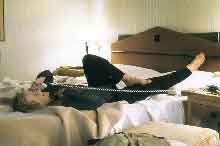
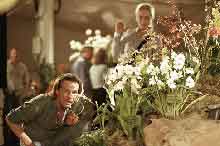
Okay, let's get things straight first: Charlie Kaufman is real. Susan Orlean is real. The Orchid Thief is real, you can order it off Amazon and everything. Catherine Keener and John Cusack are real, but you probably already knew that. But beyond that, it's not always easy to tell what's real in this movie. Just who is Donald Kaufman? I mean, he got a screenwriting credit for this movie and all, but is he real? Is he a fabrication of Charlie Kaufman the man, or even Charlie Kaufman the character? For that matter, just how different is Charlie the man from Charlie the character to begin with? Same goes with Susan Orlean and John Laroche. Who is this Robert McKee fellow, and did he really influence Charlie Kaufman? My head hurts just trying to comprehend it all. Maybe that's why I hate this movie.
ADAPTATION starts out simply enough. We meet Charlie Kaufman, who we're pretty sure is real, on the set of the 1999 film BEING JOHN MALKOVITCH, in itself one of the most brilliant films of that year. While standing on the set of a movie that he penned, he still feels like an outsider, as if he doesn't really fit in with this Hollywood machine he's become a part of. He's been given the task of adapting a book, Orlean's The Orchid Thief, into a screenplay. He's a screenwriter, so this shouldn't be the toughest task, right? Well, he tries. And tries. And ultimately, while he loves the book, he's just not sure how this is going to be a movie. Meanwhile, his twin brother Donald (and at this point we're not sure how he fits into the picture) has an idea to write a screenplay of his own, getting words of encouragement from his mother and learning his craft in a three-day workshop by Robert McKee. Of course, having Donald barge in on what Charlie has done all his life insults Charlie, who deconstructs all of Donald's ideas. How's Donald gonna pull off this Multiple-personality thriller? Are the answers on the screen as we speak at this moment? Is Donald a part of Charlie, or a dream of Charlie's, or a plot device for Charlie? It's not quite certain at this point.
Of course, what's really bothering Charlie is that he can't seem to make his adaptation of the novel seem interesting. What's more interesting to him are his fantasies of the author. So, in a moment of desparation, he starts writing himself into the story. So now, we're watching a guy write himself into the very movie we're watching. But as a screenwriter, and a storyteller, how is he going to make things in his own life interesting? And why is it that his brother Donald, who just wrote a piece-of-shit thriller with no experience under his sleeve, suddenly selling his screenplay for six figures? It's all led Donald almost to a suicidal point. Maybe the answers lie with the man who seems to have turned his brother into an overnight auteur.
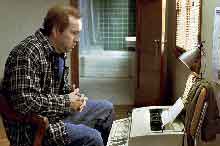
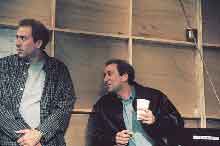
Charlie attends McKee's class, and brings a question up to his instructor: What can you do to make a story interesting that reflects real life? McKee takes exception to the idea that real life isn't interesting, and verbally assaults Charlie at his dare to make such a statement. But this seems to turn Charlie around. Suddenly he knows what he needs to do to turn this movie around. Perhaps not-so-coinceidentally, the movie we're watching suddenly makes a 180 degree turn as well. All of a sudden there's more to the relationship between Susan Orlean and her subject, John Laroche. Suddenly the brothers Kaufman feel the need to play sleuth. Suddenly there's chase scenes through the swamp, rampant drug use, gunplay, auto accidents, even alligator attacks. Meanwhile, there's still an underlying brotherly unity message as Donald has suddenly become the ironic wind beneath Charlie's wings.
The fine line between fantasy and reality is fun to explore in this movie. We know for sure what's real, and there's parts that we know for sure aren't real, but where exactly does Kaufman the real person decide to start embellishing the tale of Kaufman the character for the sake of the story? Apparently, it's from the start. As far as I can tell, there is no real-live Donald Kaufman. Sure, he'll probably be nominated for an Oscar this year, but he's a maguffin. A figment of the writer's imagination. Perhaps even a projection of part of Charlie's personality. It's still not quite clear as to why he exists in the first place. He serves as both a protagonist and an antagonist in the same sphere. But when does Donald enter the picture? Was he there from the start? Is he a retroactive interpolation in the story? Why does my head hurt so much thinking about all of this? Why is Donald so fixated on multiple personalities and trick photography? It's all quite baffling.
That's why I hate this movie. This movie is so fucking good that I hate it. Two hours of celluloid shouldn't make me dwell so much on anything. It's just not fair. I hate you, Charlie Kaufman, for being so goddamn clever. I hate you for being such a brilliant screenwriter as well as an identifiable character who may or may not have really experienced certain things in that brilliant fucking movie you call Adaptation. I even hate the brilliant duality of the title.
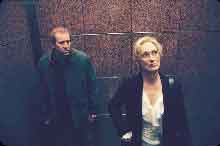
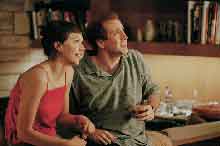
I could really go on forever about this movie, but I really should refrain because going into more analysis would really just reveal too much about the story and then I would just have to do some more explaining about how this movie drives me crazy with its goodness and why you should all rush out and see it and that all these fucktards who call it "Post-modern masturbation" or whatever and that Charlie is trying to talk down to his audience can just fuck off because this movie is brilliant and they're just pissed because they know they could never even dream of making a movie anywhere close to this good.
Unless the next few weeks can prove me wrong, this is the best movie of 2002, hands down.

For questions, comments, or the occasional stalking letter, send mail to Noel Wood. Please give proper credit when using any materials found within this site.